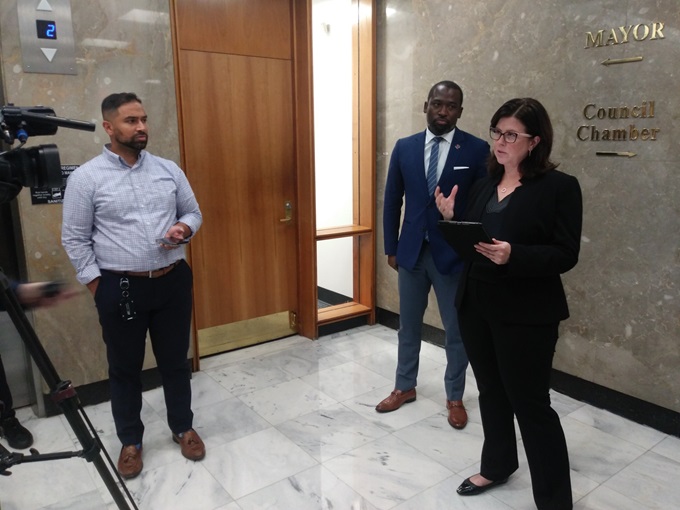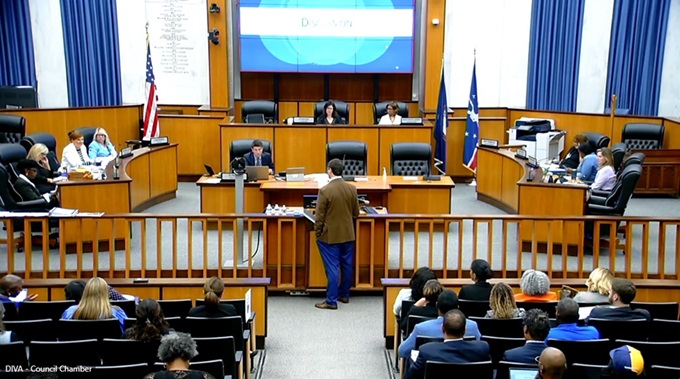
City Council President Kristen Nye joined Mayor Levar Stoney in announcing the rebate at Monday’s press conference at City Hall. (Jonathan Spiers photo)
Amid what’s become a more-heated debate than usual over whether to reduce Richmond’s real estate tax rate, City Council is mulling proposals that now include a 4-cent tax rebate for all property owners and more targeted tax relief for low-income and older residents.
In a press conference Monday, Mayor Levar Stoney and Council President Kristen Nye announced the proposed rebate and two new relief programs that city administrators recommend over Councilmember Reva Trammell’s calls to reduce the rate, which stands at $1.20 per $100 of assessed value.
Weeks earlier, in a committee meeting that at times turned testy, Trammell pushed for a 4-cent reduction to the rate, which she noted has remained unchanged since 2009. Trammell argues that a rate cut is needed to help offset real estate assessments that have risen in that time and outpaced many residents’ abilities to afford their rents and mortgages.
Councilmembers Ellen Robertson and Ann-Frances Lambert have since added their names to Trammell’s proposal, which Nye had countered with a proposal to maintain the current tax rate in favor of a rebate and targeted tax relief. She and administrators maintain that an across-the-board rate cut would benefit the city’s highest-assessed property owners most, rather than those who need the relief most.
Both proposals were continued to this month’s meeting of council’s Finance and Economic Development Standing Committee, which is slated to resume the rate debate Thursday.
But on Monday, Nye and Stoney announced the rebate proposal and additional relief programs, which were detailed to councilmembers in a separate committee meeting later in the day.
The onetime 4-cent rebate would effectively return $16 million in surplus real estate taxes from last fiscal year to taxpayers who paid them. Rebate checks would be mailed to property owners in February.
The relief programs proposed, collectively called RVA Stay, include a gap grant pilot program in which low-income residents who spend more than 30 percent of their income on housing costs can receive up to $200 a month for six months in assistance. The grants would be available to both homeowners and renters.
Also proposed is the Richmond Freeze Program, in which homeowners who are 65 years or older or permanently disabled would be exempt from real estate tax increases. Their current tax bill would be frozen based on their home’s prior year assessment.
In announcing the proposals, Nye credited Trammell, who attended the press conference, for applying the pressure that caused them to be produced.
“I’d like to say ‘thank you’ to Councilwoman Trammell for bringing forward the $1.16 paper, because if she didn’t do that, I don’t think we’d be having this discussion and looking at all these options,” Nye said. Other councilmembers gave similar kudos to Trammell at Monday’s committee meeting.
However, following the announcement, Trammell maintained that a tax cut, not a rebate, is what residents need to not be priced out of the city. She said she’d continue to push for the rate reduction, and did so in the meeting.
Stating that the last rate reduction in 2009 dropped the rate by 3 cents, Trammell said in Monday’s meeting, “I’m only asking for 4.”

The rebate and targeted tax relief proposals were detailed during a council committee meeting Monday. (Screenshot)
The rate debate has been recurring in recent years, fueled by the reassessments that are realized this time of year but also a state law that triggers a “roll back” rate to offset annual increases to assessments of 1 percent or more. If council wants to maintain the city’s previous tax rate, it must approve an increase from the roll-back rate, hence Nye’s and Trammell’s proposals.
The city also is currently working to align its assessment calendar so it falls during the spring, when council is preparing the annual budget. Doing so, administrators and councilmembers say, would facilitate the tax rate discussion so that any adjustments could be worked into the budget.
Mayor Stoney said changing the tax rate now would not only cut a $3.2 million hole in the current budget, but also have the effect of removing $200 million out of the city’s multiyear capital improvement plan and compromise collective-bargaining agreements that council has finalized with firefighters, police and other city employees.
While he disagrees with reducing the rate, Stoney said at Monday’s press conference, “I think debating these fiscal questions are good discussions to have at this moment, particularly when we know a number of our residents are experiencing the burden of rising costs.”
Monday’s announcement cited statistics from the 2023 American Community Survey, which reported that over a quarter of Richmond renters, or approximately 43,000, are spending more than half of their income on housing. Nearly twice that are spending 30% or more of their income on rent, while the average residential assessment in 2023 was about $340,000, according to the survey.
Council has provided tax rebates before. Two years ago, it approved a 5-cent rebate as an alternative to previously proposed reductions to the tax rate. That rebate amounted to an $18 million surplus from the 2022 fiscal year.

City Council President Kristen Nye joined Mayor Levar Stoney in announcing the rebate at Monday’s press conference at City Hall. (Jonathan Spiers photo)
Amid what’s become a more-heated debate than usual over whether to reduce Richmond’s real estate tax rate, City Council is mulling proposals that now include a 4-cent tax rebate for all property owners and more targeted tax relief for low-income and older residents.
In a press conference Monday, Mayor Levar Stoney and Council President Kristen Nye announced the proposed rebate and two new relief programs that city administrators recommend over Councilmember Reva Trammell’s calls to reduce the rate, which stands at $1.20 per $100 of assessed value.
Weeks earlier, in a committee meeting that at times turned testy, Trammell pushed for a 4-cent reduction to the rate, which she noted has remained unchanged since 2009. Trammell argues that a rate cut is needed to help offset real estate assessments that have risen in that time and outpaced many residents’ abilities to afford their rents and mortgages.
Councilmembers Ellen Robertson and Ann-Frances Lambert have since added their names to Trammell’s proposal, which Nye had countered with a proposal to maintain the current tax rate in favor of a rebate and targeted tax relief. She and administrators maintain that an across-the-board rate cut would benefit the city’s highest-assessed property owners most, rather than those who need the relief most.
Both proposals were continued to this month’s meeting of council’s Finance and Economic Development Standing Committee, which is slated to resume the rate debate Thursday.
But on Monday, Nye and Stoney announced the rebate proposal and additional relief programs, which were detailed to councilmembers in a separate committee meeting later in the day.
The onetime 4-cent rebate would effectively return $16 million in surplus real estate taxes from last fiscal year to taxpayers who paid them. Rebate checks would be mailed to property owners in February.
The relief programs proposed, collectively called RVA Stay, include a gap grant pilot program in which low-income residents who spend more than 30 percent of their income on housing costs can receive up to $200 a month for six months in assistance. The grants would be available to both homeowners and renters.
Also proposed is the Richmond Freeze Program, in which homeowners who are 65 years or older or permanently disabled would be exempt from real estate tax increases. Their current tax bill would be frozen based on their home’s prior year assessment.
In announcing the proposals, Nye credited Trammell, who attended the press conference, for applying the pressure that caused them to be produced.
“I’d like to say ‘thank you’ to Councilwoman Trammell for bringing forward the $1.16 paper, because if she didn’t do that, I don’t think we’d be having this discussion and looking at all these options,” Nye said. Other councilmembers gave similar kudos to Trammell at Monday’s committee meeting.
However, following the announcement, Trammell maintained that a tax cut, not a rebate, is what residents need to not be priced out of the city. She said she’d continue to push for the rate reduction, and did so in the meeting.
Stating that the last rate reduction in 2009 dropped the rate by 3 cents, Trammell said in Monday’s meeting, “I’m only asking for 4.”

The rebate and targeted tax relief proposals were detailed during a council committee meeting Monday. (Screenshot)
The rate debate has been recurring in recent years, fueled by the reassessments that are realized this time of year but also a state law that triggers a “roll back” rate to offset annual increases to assessments of 1 percent or more. If council wants to maintain the city’s previous tax rate, it must approve an increase from the roll-back rate, hence Nye’s and Trammell’s proposals.
The city also is currently working to align its assessment calendar so it falls during the spring, when council is preparing the annual budget. Doing so, administrators and councilmembers say, would facilitate the tax rate discussion so that any adjustments could be worked into the budget.
Mayor Stoney said changing the tax rate now would not only cut a $3.2 million hole in the current budget, but also have the effect of removing $200 million out of the city’s multiyear capital improvement plan and compromise collective-bargaining agreements that council has finalized with firefighters, police and other city employees.
While he disagrees with reducing the rate, Stoney said at Monday’s press conference, “I think debating these fiscal questions are good discussions to have at this moment, particularly when we know a number of our residents are experiencing the burden of rising costs.”
Monday’s announcement cited statistics from the 2023 American Community Survey, which reported that over a quarter of Richmond renters, or approximately 43,000, are spending more than half of their income on housing. Nearly twice that are spending 30% or more of their income on rent, while the average residential assessment in 2023 was about $340,000, according to the survey.
Council has provided tax rebates before. Two years ago, it approved a 5-cent rebate as an alternative to previously proposed reductions to the tax rate. That rebate amounted to an $18 million surplus from the 2022 fiscal year.




The city of Richmond taxes need to drop. A tremendous amount has been added to the tax rolls with all the buildings that have gone up.
The counties get by, and do a better job, with a rate of .80 compared to Richmond’s 1.20. We see the waste of money every day in the city, much better to give that money back to taxpayers.
We own property in both the City of Richmond and the eastern edge Goochland County. Goochland’s real estate tax rate is only .53 and it is the most lucrative place to own a house in all of metro Richmond. If the city would lower the rate, it would certainly increase incentives for people to build, buy, and develop in the city – ultimately leading to an increase in total revenue.
comparing Goochland’s municipal expenses and needs is beyond apples and oranges
agreed
A rebate is never the solution. That’s a “feel good pat yourself on the back” for the officials. Also, the amount of wasted money that goes in to mailing all these checks is ridiculous.
Can’t be rid of Stoney soon enough.
Someone please correct my math if it’s wrong, but a 4cent rebate equals $40 per $100,000 home value? Honestly I’d rather the city just use that $16million on something. The rebate is too small to really make a difference on an individual level, but that total amount could potentially do something useful.
I think that math is correct – i was using the wrong multiplier.
If the city would sell off Navy Hill in individual parcels instead of trying sell the whole thing to one buyer for an ego project for the mayor the city could drastically cut real property taxes. Instead, the city lets all that property sit idle and untaxed.
mayor’s term is about to end and he’s running for Lt Gov – I hardly think he’s expecting any last minute ‘ego projects.”
I say give the 100% of the 4-cent rebate to elderly and disabled on low, fixed incomes. My housing payment went up $400 per month with the new tax and insurance increases. At least young & healthy, low-income folks can always look for better-paying jobs.
We are considering moving out of the city because the rates are too high, and I’m not the only one. Richmond needs to permanently lower the rate and not just give rebates. Look at Goochland, Henrico, etc. Why pay 1.20 when we can move ten minutes in any direction and pay HALF the taxes? If Richmond wants to keep its residents, lower the rates.
Half of $1.20 is $.60. Henrico’s rate is $.90 and Chesterfield is $.85, and they are the only localities within 10 minutes of city limits. If you want to expand your radius to include the outer counties, Hanover is $.81 and Powhatan is $.69, still more than half. Go out to Goochland and it’s $.53, Amelia is $.46, and New Kent is $.59, and people that want their kids to get a quality education will probably see the value in higher taxes when comparing those localities to the others.
Goochland is more than half, Henrico is less than half–the point is, all the other counties are way less.
And you get what you pay for. If you want less services by all means move to Goochland. To compare Goochland’s government to Richmond’s requires considering way more than just the real estate tax rates.
You said “If Richmond wants to keep its residents, lower the rates”. But if someone buys your house for more than you paid for it when you leave, you’re not punishing the city by lowering the tax base, you’re rewarding the city by increasing the tax base.
All Richmond homeowners should really, really say a big Thank you to Mr.Stoney.
Why should anyone trust these quoted budget deficit / surplus amounts? Do these figures come from the City’s Finance Department?
Before saying that only lower-income homeowners should get a reduction or rebate, remember that higher-income potential homebuyers DO consider RVA’s higher tax rate when deciding where to buy a home. Making home ownership in the city unattractive for higher-income home buyers and having them decide to buy in a surrounding county instead does the city tax base no good at all.
Honestly, I don’t think the tax rate is a a factor at all for higher income folks. They’re moving into the city for convenience and class, and understand that comes with a higher cost. The tax rate increase is small potatoes compared to the increase in cost per square foot for a house in the city compared to those in the county.
Schools move the needle more than anything, and high income folks know that living in the city comes with private school tuition (for middle and high school at least).
Whether you like the way the city is run or not, the city needs the revenue to provide basic services (or try to). And I don’t see how cutting rates would to drive economic growth – there’s no where to build new single family homes, existing homes are still selling quickly for the most part, and multi-family development seems to be doing just fine as it is. Another thing to keep in mind is that the city still has a ways to go with getting assessments to match actual home values. Most assessments are 10-20+% lower than actual resale values,… Read more »
My assessment each of the last 3 years is consistently well above what my house would sell for. I apply for Office Review and it is reduced. Then the following year they recalculate as if the prior Office Review never happened and raise my assessment by 25-30% so I have to apply again. It is madness. I have no idea what the deal if because new construction homes the same SF with same BR/BA as mine within 1 block away have sold for $480k this summer and the city keeps trying to nail me for $600K plus… If I just… Read more »
We don’t want a rebate! We want a reduction in the tax rate. Reva has been advocating for a reduction in the rate for as long as I can remember, so why didn’t you listen to her and study the issue way back then? Council has been complicit with the mayor in the lack of foresight on this tax issue. One of my issues with the high rate is the lack of good city services that we receive. It literally takes months to get an issue solved that the city is responsible for fixing. The mayor has been in office… Read more »